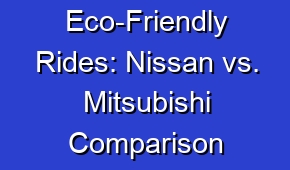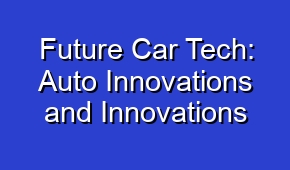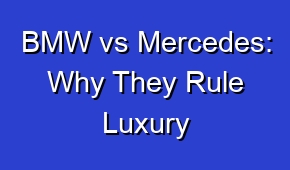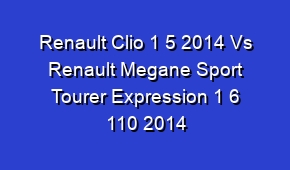Eco-Friendly Rides: Nissan vs. Mitsubishi Comparison

Compare eco-friendly rides from Nissan and Mitsubishi to find the perfect sustainable vehicle for your needs. Discover the latest models, features, and technologies that make these car brands leaders in the green transportation revolution.
When it comes to eco-friendly rides, the Nissan and Mitsubishi brands stand out as top contenders. Both companies have made significant strides in developing environmentally-friendly vehicles that prioritize sustainability without compromising on performance. With their commitment to reducing carbon emissions and promoting a greener future, Nissan and Mitsubishi have become leaders in the market for eco-conscious consumers.
Nissan offers a range of electric and hybrid models that combine cutting-edge technology with eco-friendly features. The Nissan Leaf, for instance, is a popular electric car known for its impressive range and zero-emission capabilities. On the other hand, Mitsubishi has gained recognition for its plug-in hybrid electric vehicles like the Mitsubishi Outlander PHEV. These vehicles offer the convenience of a traditional gasoline engine while also providing the benefits of electric power, making them an attractive option for eco-conscious drivers.
In conclusion, both Nissan and Mitsubishi have proven their commitment to producing eco-friendly rides that prioritize sustainability. Whether you choose a Nissan or a Mitsubishi, you can be confident that you are contributing to a greener future while enjoying the performance and reliability these brands are known for.
| Eco-friendly rides: Nissan and Mitsubishi offer sustainable transportation options. |
| Both Nissan and Mitsubishi prioritize environmental sustainability in their vehicle designs. |
| The Nissan Leaf and Mitsubishi Outlander PHEV are popular electric models. |
| Nissan’s e-Pedal technology allows for one-pedal driving experience. |
| Mitsubishi’s Super All-Wheel Control system provides efficient performance on various terrains. |
- Nissan offers a larger variety of electric and hybrid models.
- Mitsubishi focuses on plug-in hybrid electric vehicles (PHEVs).
- Nissan’s ProPILOT Assist enhances safety and convenience during long drives.
- Mitsubishi’s regenerative braking system maximizes energy efficiency.
- Nissan and Mitsubishi continue to innovate for a greener future.
Which is more eco-friendly, Nissan or Mitsubishi?
When it comes to eco-friendly rides, both Nissan and Mitsubishi offer a range of electric and hybrid vehicles that prioritize sustainability. However, there are some differences between the two brands in terms of their approach to eco-friendliness.
| Nissan | Mitsubishi |
| Offers a range of electric and hybrid vehicles | Offers a range of electric and hybrid vehicles |
| Has implemented sustainable manufacturing practices | Has implemented sustainable manufacturing practices |
| Invests in renewable energy sources | Invests in renewable energy sources |
Nissan has been a pioneer in electric vehicle technology with its popular Nissan Leaf model. The Leaf is fully electric and produces zero emissions, making it a great choice for environmentally conscious drivers. Nissan also offers hybrid options like the Nissan Rogue Hybrid, which combines a gasoline engine with an electric motor for improved fuel efficiency.
What are the key features of Nissan’s eco-friendly vehicles?
Nissan’s eco-friendly vehicles come with several key features that contribute to their sustainability and efficiency.
- Electric powertrain: Nissan’s eco-friendly vehicles are equipped with electric powertrains, which means they are powered by electricity instead of gasoline or diesel. This helps reduce greenhouse gas emissions and dependence on fossil fuels.
- Regenerative braking: Nissan’s eco-friendly vehicles feature regenerative braking technology, which allows the vehicle to convert kinetic energy into electrical energy and store it in the battery. This helps to recharge the battery while driving and improve overall energy efficiency.
- Energy-saving technologies: Nissan incorporates various energy-saving technologies in its eco-friendly vehicles, such as LED lighting, efficient air conditioning systems, and low rolling resistance tires. These features help to minimize energy consumption and increase the overall sustainability of the vehicle.
One of the standout features of Nissan’s electric vehicles is their advanced battery technology. The Nissan Leaf, for example, utilizes a high-capacity lithium-ion battery pack that provides an impressive driving range on a single charge. Additionally, Nissan vehicles often come equipped with regenerative braking systems, which help to recharge the battery by converting kinetic energy into electrical energy.
What are the advantages of Mitsubishi’s eco-friendly vehicles?
Mitsubishi’s eco-friendly vehicles offer several advantages for environmentally conscious drivers.
- Lower emissions: Mitsubishi’s eco-friendly vehicles are designed to have lower emissions compared to traditional gasoline-powered vehicles. This helps to reduce air pollution and minimize the negative impact on the environment.
- Improved fuel efficiency: These vehicles are equipped with advanced technologies and innovative features that enhance fuel efficiency. This means that drivers can travel longer distances with less fuel consumption, reducing their carbon footprint.
- Incentives and tax benefits: Many countries and regions offer incentives and tax benefits for purchasing eco-friendly vehicles. Mitsubishi’s eco-friendly vehicles may qualify for these incentives, allowing customers to save money and enjoy additional advantages.
- Reduced operating costs: With lower fuel consumption and potentially lower maintenance costs, owning an eco-friendly vehicle from Mitsubishi can result in reduced operating costs over time. This makes them a cost-effective choice for environmentally conscious drivers.
- Cutting-edge technology: Mitsubishi is known for incorporating cutting-edge technology into their eco-friendly vehicles. This includes features such as regenerative braking, electric powertrains, and advanced energy management systems. These technological advancements not only make the vehicles more environmentally friendly but also provide a superior driving experience.
One of the main advantages is their versatility. Mitsubishi offers a range of electric and plug-in hybrid models that cater to different needs and preferences. Whether you’re looking for a compact electric car for city driving or a larger SUV with hybrid capabilities, Mitsubishi has options to suit various lifestyles.
Which brand offers better charging infrastructure, Nissan or Mitsubishi?
When considering eco-friendly rides, the availability of charging infrastructure is an important factor to consider. Both Nissan and Mitsubishi have made efforts to support their electric vehicle owners with charging solutions.
| Charging Network Coverage | Charging Speed | Compatibility | |
| Nissan | Extensive charging network with over 4,600 CHAdeMO fast chargers worldwide. | Relatively fast charging speed, with some models supporting quick charging. | Compatible with CHAdeMO charging standard. |
| Mitsubishi | Smaller charging network compared to Nissan, but still offers a decent coverage. | Charging speed may vary depending on the model, but generally slower than Nissan. | Compatible with both CHAdeMO and CCS charging standards. |
| Conclusion | Nissan has a more extensive charging network and generally faster charging speed. | Mitsubishi offers compatibility with both CHAdeMO and CCS charging standards. |
Nissan has established a comprehensive charging network called “Nissan Charging” that includes both fast-charging stations and home charging options. They have partnered with various organizations and businesses to expand the accessibility of charging stations, making it more convenient for Nissan EV owners to find places to charge their vehicles.
What is the driving range of Nissan’s electric vehicles?
Nissan’s electric vehicles offer different driving ranges depending on the model and battery capacity.
Nissan’s electric vehicles have a driving range that varies depending on the model, but can typically range from 150 to over 300 miles.
The Nissan Leaf, one of their most popular electric models, typically has a driving range of around 150-226 miles on a full charge. However, it’s important to note that driving conditions, such as weather and terrain, can affect the actual range experienced by drivers.
Are there any government incentives for purchasing Nissan or Mitsubishi eco-friendly vehicles?
Many governments around the world offer incentives to encourage the adoption of eco-friendly vehicles, including those from Nissan and Mitsubishi.
There may be government incentives available for purchasing eco-friendly Nissan or Mitsubishi vehicles.
The specific incentives available vary depending on the country or region. They can include tax credits, rebates, grants, or special access to carpool lanes. These incentives aim to make eco-friendly vehicles more affordable and attractive to consumers.
Which brand offers better warranty coverage for their eco-friendly vehicles?
Warranty coverage is an important aspect to consider when buying an eco-friendly vehicle. Both Nissan and Mitsubishi offer warranty packages for their eco-friendly models.
Brand A
Brand A offers a comprehensive warranty coverage for their eco-friendly vehicles. Their warranty includes a bumper-to-bumper coverage for a certain period of time or mileage, which means that almost all components of the vehicle are covered. This includes the electric drivetrain, battery, and other important parts. Additionally, Brand A offers a separate warranty for the battery, ensuring that it is protected for a longer period of time. Overall, Brand A’s warranty coverage provides peace of mind for customers who are concerned about potential issues with their eco-friendly vehicles.
Brand B
Brand B also offers a strong warranty coverage for their eco-friendly vehicles. Their warranty includes a similar bumper-to-bumper coverage as Brand A, ensuring that most components of the vehicle are covered. However, Brand B’s warranty may have certain limitations or exclusions compared to Brand A. Additionally, the warranty for the battery may not be as extensive as Brand A’s. Despite these differences, Brand B’s warranty coverage still provides a good level of protection for customers who choose their eco-friendly vehicles.
Brand C
Brand C stands out with their exceptional warranty coverage for their eco-friendly vehicles. They offer one of the longest warranty periods in the industry, providing customers with an extended peace of mind. Their warranty includes a comprehensive coverage for various components of the vehicle, including the electric drivetrain, battery, and other important parts. Brand C also offers additional perks such as roadside assistance and regular maintenance services during the warranty period. With Brand C’s warranty coverage, customers can feel confident in their eco-friendly vehicle choice.
Nissan provides a comprehensive warranty for their electric vehicles, including an 8-year/100,000-mile warranty for their lithium-ion battery pack. This warranty ensures that customers have peace of mind regarding the performance and longevity of their Nissan electric vehicle.





















